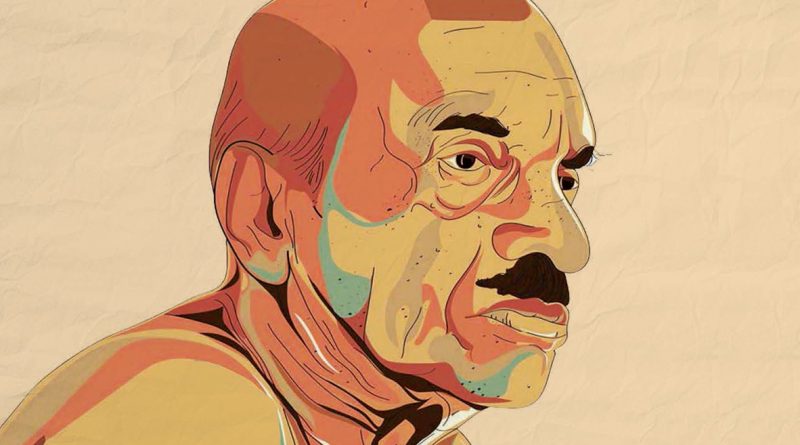The Continuum of Innocence and Agony

Vaikom Muhammad Basheer isn’t just a name on a book cover; he’s a magician who weaves tales with the threads of raw emotion and sarcasm. His masterpiece, Balyakalasakhi (Childhood Companion), isn’t merely a story; it’s a tapestry woven with the vibrant colours of childhood innocence and the silenced tones of a life unfulfilled. This heart-touching tale of Majeed and Suhra has become a cornerstone of my understanding of love, loss, and the bittersweet beauty of existence. Basheer’s prose dances on the page like fireflies on a summer night – sometimes flickering with gentle humour, other times illuminating the depths of despair. His characters, much like these fireflies, are real and relatable, their flaws reflecting the imperfections we all carry within. This is  precisely what drew me into Balyakalasakhi. Majeed, with his rebellious spirit and yearning for a life less ordinary, felt like a kindred spirit. Suhra’s quiet strength and unwavering determination in the face of an oppressive marriage became an inspiration, a testament to the resilience of the human spirit. The early chapters appear with the innocence of childhood friendship. Majeed and Suhra’s playful banter, their shared secrets whispered under the shade of a mango tree, took me back to a time when scraped knees and stolen glances held the power to ignite a universe of emotions. These scenes unearthed forgotten memories of my own childhood companions, reminding me of the magic of those unburdened years. However, as the story unfolds, the shadows of societal norms and economic hardship begin to cast their long, dark fingers.
precisely what drew me into Balyakalasakhi. Majeed, with his rebellious spirit and yearning for a life less ordinary, felt like a kindred spirit. Suhra’s quiet strength and unwavering determination in the face of an oppressive marriage became an inspiration, a testament to the resilience of the human spirit. The early chapters appear with the innocence of childhood friendship. Majeed and Suhra’s playful banter, their shared secrets whispered under the shade of a mango tree, took me back to a time when scraped knees and stolen glances held the power to ignite a universe of emotions. These scenes unearthed forgotten memories of my own childhood companions, reminding me of the magic of those unburdened years. However, as the story unfolds, the shadows of societal norms and economic hardship begin to cast their long, dark fingers.
Majeed’s exile, his father’s disapproval, and Suhra’s forced marriage paint a stark contrast to their idyllic childhood. This shift mirrored my own transition into adulthood, where dreams are forced to confront reality, and love often struggles to survive against the tide of practicality. Basheer doesn’t shy away from depicting the harsh realities of life. Suhra’s transformation from a spirited young girl to a woman trapped in a loveless marriage was a gut punch. Yet, amidst the despair, a flicker of hope remains. Majeed’s return and his defiant declaration of love – a love that refuses to be silenced – resonated deeply within me. It was a testament to the enduring human spirit, the ability to find solace and strength even in the face of loss. Balyakalasakhi transcends the boundaries of a love story. It’s a powerful critique of societal structures that dictate who we can love and how we should live. Majeed’s father, a symbol of rigid tradition, represents the forces that attempt to control our destinies. This resonated with my own struggles to navigate societal expectations and forge my own path in life.
Basheer’s subtle critique served as a catalyst, encouraging me to question the status quo and fight for the life I truly desire. But the magic of Balyakalasakhi resides not only in its thematic depth but also in Basheer’s masterful storytelling. His metaphors are like brushstrokes on a vibrant canvas, painting vivid pictures that linger long after the last page is turned. The “enthaayi sneham” (the love that burns like embers) that consumes Majeed and Suhra becomes an emotion we can touch and feel. This, coupled with Basheer’s signature humour, makes the novel a captivating journey – a testament to the power of words to evoke a kaleidoscope of emotions. Balyakalasakhi is more than just a book. It’s a piece of myself, a story that has become interwoven with the fabric of my being. It’s a reminder of the fleeting beauty of childhood dreams, the enduring strength of love, and the importance of holding on to hope even amidst the harshest realities. Basheer’s words have become a guiding light, a constant companion that whispers encouragement as I navigate the complexities of life. In a world that often feels chaotic and unforgiving, Balyakalasakhi serves as a haven, a reminder that even the most bittersweet stories can leave an indelible mark on our souls.


